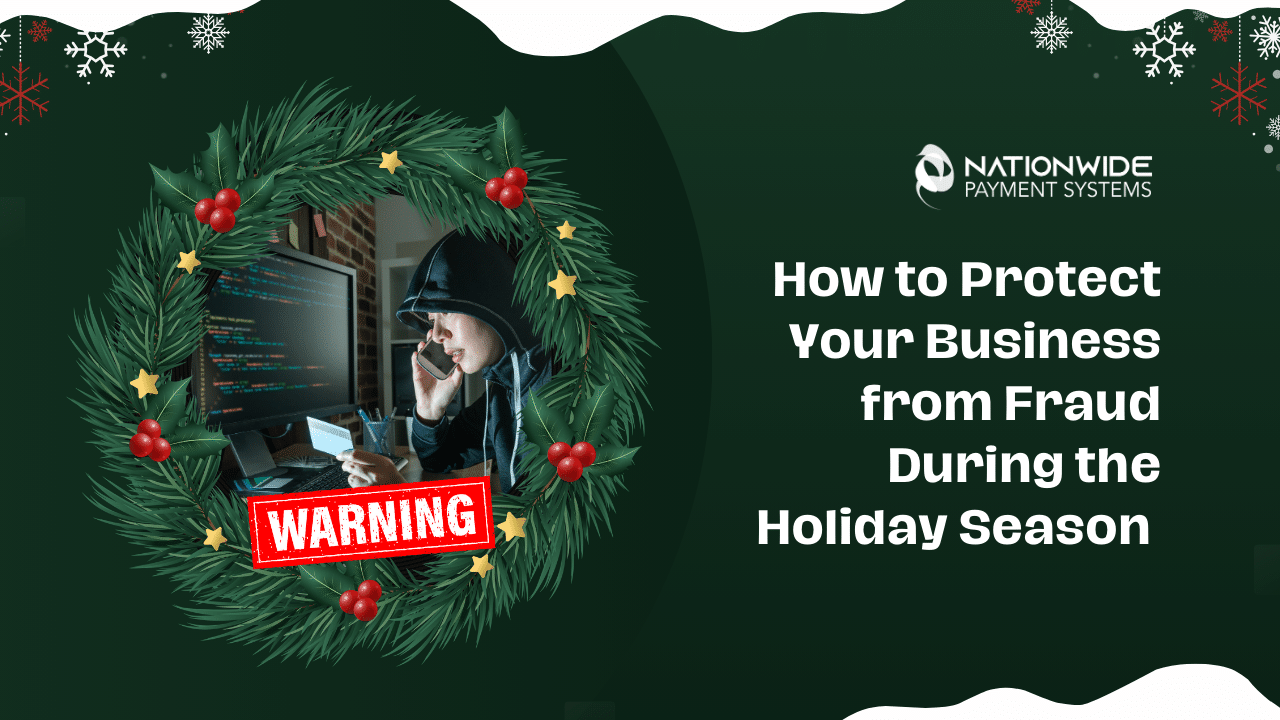How to Protect Your Business from Fraud During the Holiday Season

The holiday season is a time of joy and celebration. Still, it’s also a prime time for fraudsters to target businesses. With fraud reaching an all-time high, it’s crucial to take proactive steps to safeguard your business and employees from falling victim to scams. This article will provide essential strategies to prevent common holiday season fraud.
Types of things to watch out for:
Recognizing Common Holiday Season Scams
- Shipping to a Freight Forwarder
- “My Card Doesn’t Work – Key It In”
- Fake Authorization Numbers are given to you by the customers.
Educating Employees on Fraud Awareness
- Conducting Fraud Prevention Workshops
- Providing Resources for Reporting Suspicious Activity
Monitoring Transactions Closely
- Setting Daily Transaction Limits
- Implementing Real-time Fraud Alerts
- Tracking transactions and shipping addresses
Strengthening Online Security Measures
- Installing SSL Certificates
- Regularly Updating Security Software
- Monitor your Payment Gateway
- Set up velocity filters on your website, shopping cart, hosting, and Gateway.
Building Trust with Customers
- Have an SSL Certificate on your website
- Offering Secure Payment Options
- Clear policies on the website and in-store for refunds and returns
Utilizing Multi-factor Authentication
- Adding an Extra Layer of Security
- Protecting Sensitive Information
- Using this on systems for your company’s safety
Conducting Regular Security Audits
- Do your PCI Compliance and review the policies yearly or more often
- Taking Prompt Corrective Action if needed
Engaging with a Fraud Prevention Service
- Benefits of Professional Fraud Protection
- Choose the Right Service for Your Business: RDR, Ehtoca, or Verifi
- Using a chargeback service can be helpful if you are doing high volume or you offer digital products.
Responding swiftly to Suspected Fraud
- Deleting fake orders
- You are calling customers if there is a large order being placed on your website to verify the purchase and shipping info.
- Phone orders that are large or do not seem legit
Holidays = More Scammers
The holiday season brings increased business opportunities, but it also attracts fraudsters looking to exploit vulnerabilities. By recognizing common scams and implementing robust security measures, you can safeguard your business and finances.
Recognizing Common Holiday Season Scams
Shipping to a Freight Forwarder
One prevalent scam involves orders shipped to a freight forwarder. Fraudsters use this method to disguise their actual location, making it harder to trace the transaction.
“My Card Doesn’t Work – Key It In”
This deceptive tactic involves a customer claiming their card isn’t working and insisting that you manually enter the details. This can lead to unauthorized transactions and chargebacks.
Fake Authorization Numbers and Chargebacks
Fraudsters may provide a fake authorization number, tricking businesses into processing transactions. This often results in chargebacks, causing financial losses.
We are training Employees on how to spot fraud.
Make sure only to process cards with a CHIP in the Chip reader.
For web orders, the AVS, Zip, and CVV2 are in order, and set your filters so you get approvals and have someone reviewing batches daily.
Reviewing Policies and Procedures
Review policies with your staff.
Implement Two-Factor Authentication on your internal software, like banking and software.
Add an extra layer of security by requiring two-factor authentication for sensitive transactions.
Educating Employees on Fraud Awareness
Conducting Fraud Prevention Workshops
Organize workshops to educate employees about typical fraud schemes and how to identify suspicious activity. Ensure employees are not falling for email scams (phishing) and text/SMS scam messages.
Providing Resources for Reporting Suspicious Activity
Offer clear channels for employees to report any suspicious activity promptly.
Monitoring Transactions Closely
Setting Daily Transaction Limits (e-commerce)
Establishing daily transaction limits can help prevent large-scale fraudulent transactions.
Implementing Real-time Fraud Alerts
Utilize real-time alerts to flag and respond to potentially fraudulent activity promptly.
Strengthening Online Security Measures
Installing SSL Certificates
Secure online transactions by installing SSL certificates encrypting sensitive data.
Regularly Updating Security Software
Ensure all security software is current to protect against the latest threats on computers, laptops, websites, etc.
Protecting your business from holiday season fraud is paramount to ensuring its financial stability and reputation. By implementing and reviewing the strategies outlined in this article, you can reduce the risk of falling victim to scams.
If you need assistance in getting fraud controls set up, contact us.








